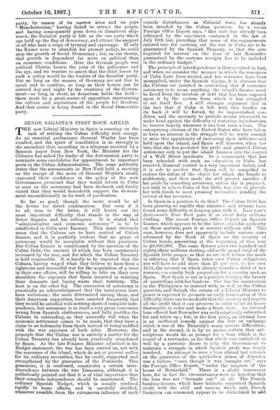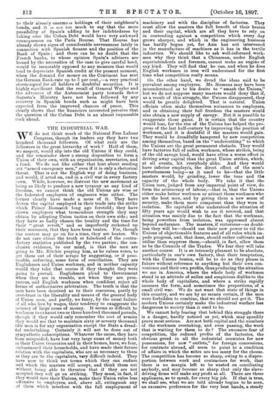SESIOR SAGASTA'S FIRST ROCK AHEAD.
So far so good, though the news would be all the better for direct confirmation. But even if it be all true to the letter, it still leaves out the most important difficulty that stands in the way of Seiior Sagasta and his colleagues. It is stated that "administrative and economic autonomy" is to be established in Cuba next January. This must obviously mean that the Cubans are to have control of Cuban finance, and it is perfectly evident that no grant of autonomy would be acceptable without this provision. But Cuban finance is complicated by the question of the Cuban Debt, the amount of which has been enormously increased by the war, and for which the Cuban Treasury is held responsible. It is hardly to be expected that the Cubans, having waged what they believe to have been a righteous and successful war for the acquisition of a voice in their own affairs, will be willing to take on their own shoulders the expenses that Spain incurred in resisting their demands and laying waste their territory. The boot is on the other leg. The concession of autonomy is practically an acknowledgment that the insurgents have been victorious : the more determined among them, and their American supporters, have asserted frequently that they would be satisfied with nothing short of complete inde- pendence, but autonomy is in itself a very great concession wrung from Spanish stubbornness, and fully justifies the Cubans in contending, as they assuredly will when the economic settlement comes to be made, that they have a claim to an indemnity from Spain instead of being saddled with the war expenses of both sides. Moreover, the principle that the Cuban war is entirely a matter for the Cuban Treasury has already been practically abandoned by Spain. As the late Finance Minister admitted in his Budget statement, the war has been carried on, not with the resources of the island, which do not at present suffice for its ordinary necessities, but by credit, supported and strengthened by the guarantee of the Peninsula. This guarantee, it is confessed, constitutes a certain inter- dependence between the two Treasuries, although it is pathetically pointed out that it is of vital importance that their complete independence should be maintained. The ordinary Spanish Budget, which is usually confined rigidly to home affairs, and is carefully shielded, whenever possible. from the extraneous influence of such outside disturbances as Colonial wars, has already been invaded by the Cuban question. As a recent Foreign Office Report says," this rule has already been infringed by the enactment contained in the law of July 10th last, providing that some of the engagements entered into for carrying out the war in Cuba are to be guaranteed by the Spanish Treasury, so that the sum required for interest on the loan of last November guaranteed by the customs receipts has to be included in the ordinary budget."
The principle of interdependence is thus accepted in fact, and when we consider the manner in which the resources of Cuba have been wasted, and her revenues have been misapplied, under the Spanish regime, it is obvious that the Cubans are justified in contending that if economic autonomy is to mean anything, the island's finance must be freed from the incubus of debt that has been imposed upon it by the system from which it has struggled to set itself free. A still stronger argument lies in the fact that if Cuba is left with this burden on its back it will be forced, by its impoverished con- dition and the necessity to provide means wherewith to make head against the difficulty of restoring its industries, to borrow heavily wherever it can best raise a loan. The enterprising citizens of the United States who have taken so keen an interest in the struggle will be ready enough to seize this opportunity of increasing their influence and hold upon the island, and Spain will discover, when too late, that she has pocketed her pride and granted Cuban autonomy only to put the island finances into the control of a Wall Street syndicate. In a community that has been schooled with such an education as Cuba has received, financial control is a very important factor, and it is safe to predict that Spain will be compelled to endure the defeat of the object for which she fought so stubbornly, and then made the still greater sacrifice f her pride by conceding autonomy, unless she is prepared, not only to relieve Cuba of her Debt, but also to provide her with funds to meet pressing necessities pending the revival of her revenues.
Is Spain in a position to do this ? The Cuban Debt has been growing so rapidly that statistics and returns have found some difficulty in keeping pace with it. Last year's Statesman's Year Book gave it as about forty millions sterling. The recent Foreign Office Report on Spanish finance, which appears to be the latest available authority on these matters, puts it at seventy millions odd. This sum, however, does not apparently include various sums advanced by the Bank of Spain on the security of Cuban bonds, amounting at the beginning of this year to £8,690,200. The same Return gives two hundred and eighty-three millions sterling odd as the grand total of the Spanish Debt proper, so that we are well within the mark in inferring that if Spain takes over Cuban obligations she will have to add more than 25 per cent. to her own Debt, the interest on which already absorbs a third of her revenue,—a cruelly high proportion for a country such as Spain. Now Spain is not in a position to enjoy the luxury of quarrelling with her bankers. She has the insurrection in the Philippines to contend with, as well as the Cuban question, and though the return of a Liberal Ministry to power is expected to promote an early termination of this difficulty, there can be no doubt that the country will require all the credit that it can preserve in order to set its house thoroughly in order and make a fresh start. Au internal loan offered last November was enthusiastically subscribed for and taken up ; but, in the first place, an internal loan is an inefficient remedy against the loss on exchange which is one of the Treasury's many serious difficulties ; and in the second, it is by no means certain that sub- scriptions would be as prompt for a loan which is the sequel of a surrender, as for that which was carried off so well by a patriotic desire to help the Government to maintain a struggle in which Spanish pride was deeply involved. An attempt to issue a loan abroad last autumn on the guarantee of the quicksilver mines of Almaden was a failure, "even though it was brought out," says the Foreign Office Report, "under the auspices of the house of Rothschild." There is a slight inaccuracy here, for in fact the circumstances were so hopeless that the loan was not "brought out" at all. The French banking-houses, which have hitherto supported Spanish credit with the skill and success which only French financiers can command, appear to be disinclined to add+ to their already enormo as holdings of their neighbour's bonds, and it is not too much to say that the mere possibility of Spain's adding to her indebtedness by taking over the Cuban Debt would have very awkward consequences on the Paris Bourse. That Bourse has already shown signs of considerable nervousness lately in connection with Spanish finance and the position of the Bank of Spain ; and there can be no doubt that the Trench banks, to whose opinion Spain's advisers are bound by the necessities of the case to give careful heed, would be inexorably opposed to any measure that would tend to depreciate Spanish credit at the present moment, when the demand for money on the Continent has sent the German Bank-rate up to 5 per cent.,—a very practical storm-signal for all holders of doubtful securities. It is 'highly significant that the recall of General Weyler and the advances of the Autonomist party towards Seff or Sagasta's Ministry have not been followed by any recovery in Spanish bonds such as might have been expected from the improved chances of peace. This clearly shows that the financiers interested perceive that the question of the Cuban Debt is an almost impassable rock ahead.







































 Previous page
Previous page